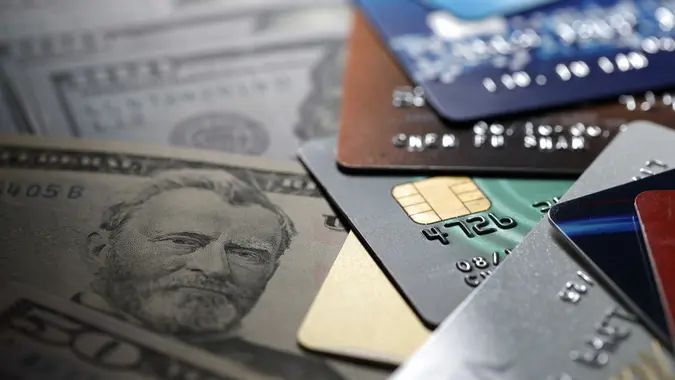Advertiser Disclosure
GOBankingRates works with many financial advertisers to showcase their products and services to our audiences. These brands compensate us to advertise their products in ads across our site. This compensation may impact how and where products appear on this site. We are not a comparison-tool and these offers do not represent all available deposit, investment, loan or credit products.
10 Things Most Americans Don’t Know About Credit Cards
 Written by
John Csiszar
Written by
John Csiszar
 Edited by
Gary Dudak
Edited by
Gary Dudak

Commitment to Our Readers
GOBankingRates' editorial team is committed to bringing you unbiased reviews and information. We use data-driven methodologies to evaluate financial products and services - our reviews and ratings are not influenced by advertisers. You can read more about our editorial guidelines and our products and services review methodology.

20 YearsHelping You Live Richer

Reviewed by Experts

Trusted by Millions of Readers
Credit cards are so convenient that they are part of daily life for many Americans. Given that fact, it’s perhaps surprising that there are so many common misconceptions about credit cards floating around.
Seeing as your credit score and how you manage your credit can affect so many areas of your life — from applying for a car loan or a home mortgage to qualifying for an apartment — it’s important to know the facts about credit cards.
Here’s a look at 10 things many people do not know about credit cards.
How To Make Your Credit Report Show as Debt-Free
Paying your entire credit card statement in full every month is a sound financial strategy. However, if you want to appear debt-free to lenders, you’ll have to alter the timing of your payments.
Every month when you get a credit card statement, your creditor reports that balance to the credit reporting agencies. Even if you pay the balance in full after getting your statement, according to your credit report, you’re still carrying that balance. To appear debt free to your creditors, you’ll need to pay off that balance in full before your statement closing date.
A Store Credit Card Counts in Your Score
There’s a common misconception that opening store-branded credit cards is not the same as opening a general credit card from an issuer like Chase Bank.
Since these types of cards can typically be used only at the store where they’re issued, many consumers mistakenly believe that they are “private issue” credit cards or somehow don’t end up in the traditional credit reporting universe. The truth is that store credit cards are issued by banks as well, and they are reported to the credit agencies just like any other type of credit card.
Closing Unused Accounts Does Not Raise Your Score
From a financial planning standpoint, it’s true that you shouldn’t have more credit cards than you need. However, if you go about canceling your unused credit cards, you might end up paying a price when it comes to your credit score, in two ways.
First, a big part of your credit score comes from your credit utilization — or the percentage of your available credit that you’re using. If you carry a balance on some cards and cancel your other ones, your credit utilization percentage will jump, thereby lowering your credit score.
Second, the average age of your credit accounts is another factor affecting your credit score, although not as significantly as your credit utilization. If you close long-standing accounts and lower the average age of your credit lines, your credit score will take another hit.
A Balance Does Not Improve Your Credit Score
A very common misconception about credit cards is that you must carry a balance to improve your credit score. This mistaken belief no doubt arises from the truth that you must use your credit cards if you’re to generate positive score reporting.
In fact, the single biggest component of your FICO credit score is your payment history, comprising a whopping 35% of your entire score. However, just because you’ll need to use your credit cards and pay them off to improve your score doesn’t mean you need to carry an outstanding balance. In fact, another big component of your credit score is the amount of debt you owe, so carrying a balance will actually trim points off your score, not add to it.
Interest Rates Vary by Credit Card Company
Most credit cards are similar in terms of how they operate. You’re extended a credit line, and every month that you make charges you’re expected to pay back at least a minimum amount. Whatever you don’t pay off in full triggers an interest charge.
However, the amount of interest that a card charges can vary greatly. If you know you’re going to be carrying a balance, don’t assume that you’ll be charged a low rate. Check with your card issuer so you know what the damage will be ahead of time.
Carrying a Balance Can Eat Into Your Credit Card Rewards
The battle for consumer credit card spending has gotten very competitive, and many card issuers now offer lucrative sign-up bonuses and ongoing perks to attract customers. Sign-up bonuses of 100,000 points or miles are now not that unusual, and points multipliers on everything from grocery store purchases to travel and office expenses can make the proper use of a rewards credit card quite beneficial for the cardholder.
However, if you have to keep an outstanding balance on your card in order to reap those rewards, you’re likely paying far more in interest costs than you’re earning in rewards.
Delinquent Debts Stay in Your Credit History for 7 Years
Making late payments on your credit cards is one of the most damaging things you can do to your credit score, short of filing for bankruptcy. For one thing, your credit score will take a significant hit, sometimes in excess of 100 points.
But the damage is much longer-lasting than that. Even if you get back on your feet and pay off your delinquent debts in full, you can’t erase the fact that you were past due in the first place. Late payments and account charge-offs stick around on your credit report for a full seven years, even if you pay them off in full.
While the damage done to your score will decrease over time, you can’t hide the fact that you missed those payments until they naturally fall off your report after nearly a decade.
Annual Fees Can Pay for Themselves — But Not Always
Credit card companies already earn money via interchange fees and interest charges on consumers, but some cards require an annual fee for you to gain access to features and benefits that will far outweigh the cost of owning the card.
Most annual fee cards, for example, offer generous sign-up bonuses that more than pay for the first year of card ownership. On an ongoing basis, various perks such as free baggage, club membership and/or upgrade seating on airlines can be worth far more to a frequent traveler than the cost of an annual fee.
Not all perks provide the same value to all consumers, however, so be sure to pay only for credit cards that provide you with perks that apply to your personal lifestyle.
Credit Reports Are Not Always Accurate
Credit reports are official records of your financial history, so it makes sense that many Americans believe that they are always accurate. The reality is that this couldn’t be further from the truth.
According to a 2024 report by two consumer groups, 44% of American consumers found at least one error in their credit reports. That’s a staggeringly high number for an important financial document that can affect the cost of everything from your auto loan to your home mortgage.
The lesson here is to check your credit reports frequently to ensure that your information is accurate.
You Should Have More Than One Credit Card
Some Americans believe that owning a single credit card is the right way to go when it comes to credit scoring and managing their finances. But the truth is that having a mix of credit is the best way to help boost your credit score, and having more than one credit card will often maximize the rewards you can earn.
Your credit mix is actually its own category within your FICO score, amounting to 10% of the overall score. If you can show creditors that you can responsibly handle credit of different types, such as installment loans, credit cards and retail accounts, your score will improve.
Similarly, owning different types of credit cards that provide rewards in different areas — such as groceries, gasoline or streaming services — can maximize the total benefit you receive from your cards.
Share This Article:




You May Also Like




Experts Warn Consumers Could Pay More If 10% Credit Card Cap Limits Rewards and Raises Other Fees
January 14, 2026
8 min Read



3 Ways Trump's Credit Card Plan Could Have Major Consequences for Your Money
January 13, 2026
8 min Read




Here's Why You Should Never Use a Debit Card, According to Codie Sanchez
December 16, 2025
8 min Read





Bank of America Expert: 3 Ways Football Fans Can Maximize Credit Card Rewards This Season
October 31, 2025
8 min Read
Make your money work for you
Get the latest news on investing, money, and more with our free newsletter.
By subscribing, you agree to our Terms of Use and Privacy Policy. Unsubscribe at any time.


Thanks!
You're now subscribed to our newsletter.
Check your inbox for more details.



Sending you timely financial stories that you can bank on.
Sign up for our daily newsletter for the latest financial news and trending topics.
For our full Privacy Policy, click here.
Looks like you're using an adblocker
Please disable your adblocker to enjoy the optimal web experience and access the quality content you appreciate from GOBankingRates.
- AdBlock / uBlock / Brave
- Click the ad blocker extension icon to the right of the address bar
- Disable on this site
- Refresh the page
- Firefox / Edge / DuckDuckGo
- Click on the icon to the left of the address bar
- Disable Tracking Protection
- Refresh the page
- Ghostery
- Click the blue ghost icon to the right of the address bar
- Disable Ad-Blocking, Anti-Tracking, and Never-Consent
- Refresh the page


